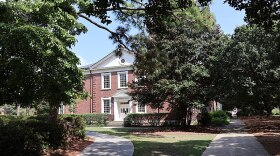The Orange County District Attorney's Office is dismissing all remaining criminal cases against protesters who led pro-Palestinian demonstrations on UNC-Chapel Hill's campus last spring. The decision came a day before some trials were set to begin.
In April, hundreds of protesters held a pro-Palestinian encampment at UNC. Demonstrators camped out overnight in tents, replaced an American flag with a Palestinian one, and had intense clashes with campus police officers. Some 36 people were detained at the protest, and 39 in total were eventually arrested with charges ranging from trespassing to resisting arrest.
Orange County District Attorney Jeff Nieman's decision to dismiss the remaining cases comes one week after the first UNC-Chapel Hill protester case went to trial. That case was dismissed by Orange County Judge Samantha Cabe, who approved the defense attorney's motion on constitutional grounds.

"(Judge Cabe) found that the state had not presented any evidence about why UNC stopped this protest," Defense Attorney Gina Balamucki told WUNC. "That is significant, because this protest happened on the public grounds of a public university. It's a classic zone where free speech is at its most constitutionally protected and UNC isn't allowed to restrict that speech just because they disagree with it."
Nieman said the judge's decision was a driving factor in his office dismissing the eight remaining cases.
"In light of the judge's decision in the case that went to trial last week combined with our evaluation of the evidence in the remaining cases, we don't think we can proceed," Nieman told WUNC.
Nieman also dismissed five other cases last week, the day before Cabe's ruling. He said his office had to dismiss the cases after they couldn’t track down the arresting officers.
During the encampment, UNC Police was assisted by a variety of outside law enforcement, including some from other public universities. Neither Chapel Hill nor Carrboro police were involved and several of their town council members condemned UNC-Chapel Hill’s protest response, calling it an "overreaction."

"There was a bit of a chaotic nature to the circumstance," Nieman said. "There were multiple law enforcement officers from other agencies outside of the university, outside the county. For those cases, we were unable to identify or locate the charging officer that would be able to testify as to what they saw and what they did."
The encampment at UNC-Chapel Hill – along with a series of other protests at NC State, UNC Asheville, and UNC Charlotte – led the UNC System to consider creating an institution-wide protest policy for all public universities in North Carolina.
These changes could potentially include what the System calls "best practices" like requiring prior approval to use campus spaces and giving more power over gatherings to campus public safety officials.
Jaelyn Miller, another defense attorney for the protesters, said the proposal is worrying.
"I think the purpose of them putting forth this policy unfortunately doesn’t strike me as a way to guide universities in following the first amendment," Miller said. "But in testing the limits of what they can control and what they can limit around free speech on these campuses."
Balamucki echoed this point, saying she hopes the case dismissals send a message to universities that they can't infringe on students' rights.

"They have a duty to our society to know that their ability to suppress free speech is very limited," Balamucki said. "And we hope that they begin to understand that also shouldn’t be their goal. Their goal should be supporting these students becoming global citizens, becoming people who will speak out against injustice, who will speak out about their political beliefs."
Last month, UNC Board of Governors Chair Wendy Murphy told WUNC that the UNC System recognizes student freedoms and the goal of any protest policy would be to prevent "chaos and vandalism."
There were eight remaining cases from UNC-Chapel Hill's April encampment that were set to be tried today and in January.
Twenty-five protesters agreed to plea deals earlier this year. Under the agreements, they have to complete either 24 or 36 hours of community service and pay court costs. Once the protesters have completed both, their charges will be dismissed.
WUNC partners with Open Campus on higher education coverage.












